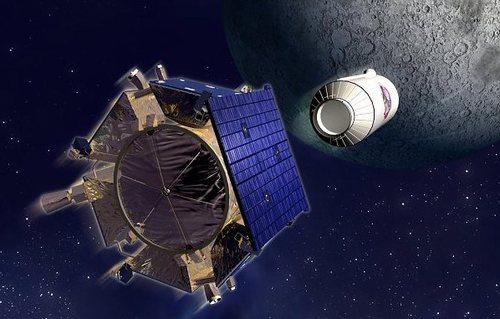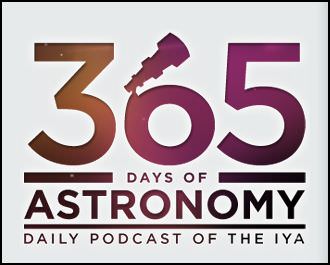If you’ve been considering contributing a podcast to the 365 Days of Astronomy but just haven’t gotten around to it yet, there’s good news: the project will be continuing for another year — its third — in 2011. As far as we can tell, 365 Days of Astronomy is the most popular and successful user-generated podcast ever, as each podcast is listened to thousands of times. If you’re looking to share your experiences, thoughts, feelings, discoveries, or anything about space and astronomy, this is your big chance to find your voice and an audience to listen.
Since it is now the Year of the Solar System, it seemed like a good reason to keep this Energizer-Bunny project from the International Year of Astronomy going for another year. As the Project Manager, I hope you’ll join in, or at least check it out and start listening daily — if you aren’t already. Here’s the official press release:
The award-winning 365 Days of Astronomy Podcast is proud to announce the project will continue for yet another year – its third year — and is now accepting sign-ups for participants for another 365 podcasts in 2011. 2011 encompasses the Year of the Solar System, which marks an unprecedented flurry of robotic exploration of space, and is the perfect opportunity for more of the public to become involved in creating podcasts to share astronomy with the world.
365 Days of Astronomy is a legacy project of the International Year of Astronomy (IYA), and in 2009 was a major project of the IYA. For two years now, the project has published one podcast for every day of the year. The episodes are written, recorded and produced by people all around the world. “This podcast gives a voice to everyone in astronomy – professionals, amateurs, and those who just enjoy the amazing discoveries and images of our Universe,” said Dr. Pamela Gay, chair for the IYA’s New Media Group.
The 365 Days of Astronomy podcast is now looking for individuals, schools, companies and clubs to submit 5 – 10 minutes of audio for our daily podcast.
The 365 Days of Astronomy has gained a wide audience, and each podcast is heard by 5,000 – 10,000 listeners. The project was awarded a Parsec Award in 2009 for “The Best Info-tainment” podcast in 2009, and was nominated for the “Best Fact Behind the Fiction” award in 2010.
Participants can sign up to do just 1 episode or up to 12 episodes (one per month, subject to editorial discretion). People from every continent except Antarctica have submitted podcasts the past two years, and the 365 Days of Astronomy team encourages a more diverse population from even more countries to sign up for a particular day (or days) of 2011. A calendar of astronomical events is available on the project’s website to provide ideas but the podcasts can be about virtually any astronomical topic. “We are seeking a wide range of contributions, from simple concepts or how-tos to more in-depth discussions of complex concepts,” said Dr. Gay. “Over the past two years, we received a wide range of contributions, from simple at-home first-time podcasts to highly polished and professional recordings. We expect the same for 2011 and are looking to sign up a variety of participants, from amateur astronomers, classroom teachers and students to scientists, science bloggers and big media companies.”
The project is also asking individuals and organizations for financial support.
The podcast team also invites people and organizations to sponsor the podcast by donating $30 to support 1 day of the podcast, with your dedication appearing at the start of the show. For just $360, it is possible to sponsor 1 episode per month. Alternatively, you can also have a dedication message at the end of the show for a week, for a donation at the $100 level. These donations will help pay for editing, and posting of the podcasts.
For more information visit:
365 Days of Astronomy: http://365DaysOfAstronomy.org.
Astrosphere New Media: http://www.astrosphere.org/
Year of the Solar System: http://solarsystem.nasa.gov/yss/index.cfm










